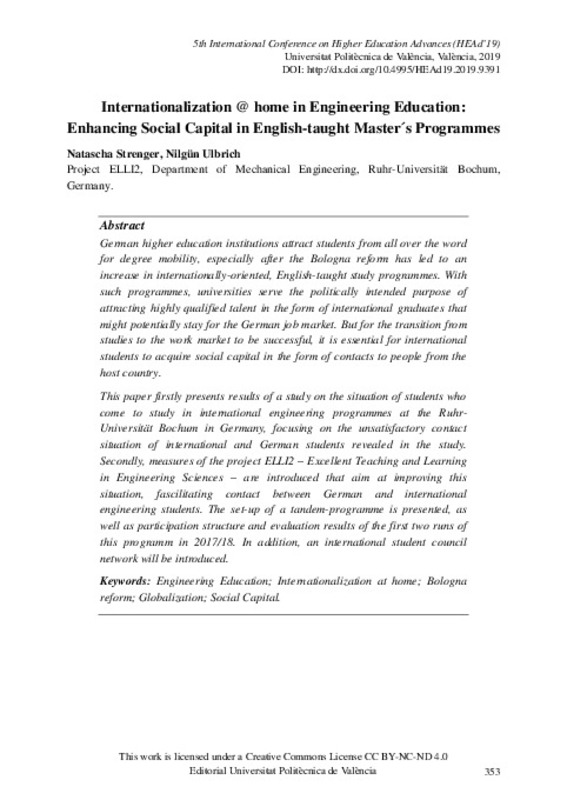JavaScript is disabled for your browser. Some features of this site may not work without it.
Buscar en RiuNet
Listar
Mi cuenta
Estadísticas
Ayuda RiuNet
Admin. UPV
Internationalization @ home in Engineering Education: Enhancing Social Capital in English-taught Master´s Programmes
Mostrar el registro sencillo del ítem
Ficheros en el ítem
| dc.contributor.author | Ulbrich, Nilgün
|
es_ES |
| dc.contributor.author | Strenger, Natascha
|
es_ES |
| dc.date.accessioned | 2019-07-29T09:14:22Z | |
| dc.date.available | 2019-07-29T09:14:22Z | |
| dc.date.issued | 2019-07-05 | |
| dc.identifier.isbn | 9788490486610 | |
| dc.identifier.issn | 2603-5871 | |
| dc.identifier.uri | http://hdl.handle.net/10251/124349 | |
| dc.description.abstract | [EN] German higher education institutions attract students from all over the word for degree mobility, especially after the Bologna reform has led to an increase in internationally-oriented, English-taught study programmes. With such programmes, universities serve the politically intended purpose of attracting highly qualified talent in the form of international graduates that might potentially stay for the German job market. But for the transition from studies to the work market to be successful, it is essential for international students to acquire social capital in the form of contacts to people from the host country. This paper firstly presents results of a study on the situation of students who come to study in international engineering programmes at the Ruhr-Universität Bochum in Germany, focusing on the unsatisfactory contact situation of international and German students revealed in the study. Secondly, measures of the project ELLI2 – Excellent Teaching and Learning in Engineering Sciences – are introduced that aim at improving this situation, fascilitating contact between German and international engineering students. The set-up of a tandem-programme is presented, as well as participation structure and evaluation results of the first two runs of this programm in 2017/18. In addition, an international student council network will be introduced. | es_ES |
| dc.format.extent | 8 | es_ES |
| dc.language | Inglés | es_ES |
| dc.publisher | Editorial Universitat Politècnica de València | es_ES |
| dc.relation.ispartof | HEAD'19. 5th International Conference on Higher Education Advances | es_ES |
| dc.rights | Reconocimiento - No comercial - Sin obra derivada (by-nc-nd) | es_ES |
| dc.subject | Higher Education | es_ES |
| dc.subject | Learning | es_ES |
| dc.subject | Educational systems | es_ES |
| dc.subject | Teaching | es_ES |
| dc.subject | Engineering education | es_ES |
| dc.subject | Internationalization at home | es_ES |
| dc.subject | Bologna reform | es_ES |
| dc.subject | Globalization | es_ES |
| dc.subject | Social capital | es_ES |
| dc.title | Internationalization @ home in Engineering Education: Enhancing Social Capital in English-taught Master´s Programmes | es_ES |
| dc.type | Capítulo de libro | es_ES |
| dc.type | Comunicación en congreso | es_ES |
| dc.identifier.doi | 10.4995/HEAD19.2019.9391 | |
| dc.rights.accessRights | Abierto | es_ES |
| dc.description.bibliographicCitation | Ulbrich, N.; Strenger, N. (2019). Internationalization @ home in Engineering Education: Enhancing Social Capital in English-taught Master´s Programmes. En HEAD'19. 5th International Conference on Higher Education Advances. Editorial Universitat Politècnica de València. 353-360. https://doi.org/10.4995/HEAD19.2019.9391 | es_ES |
| dc.description.accrualMethod | OCS | es_ES |
| dc.relation.conferencename | Fifth International Conference on Higher Education Advances | es_ES |
| dc.relation.conferencedate | Junio 26-28, 2019 | es_ES |
| dc.relation.conferenceplace | València, Spain | es_ES |
| dc.relation.publisherversion | http://ocs.editorial.upv.es/index.php/HEAD/HEAD19/paper/view/9391 | es_ES |
| dc.description.upvformatpinicio | 353 | es_ES |
| dc.description.upvformatpfin | 360 | es_ES |
| dc.type.version | info:eu-repo/semantics/publishedVersion | es_ES |
| dc.relation.pasarela | OCS\9391 | es_ES |








